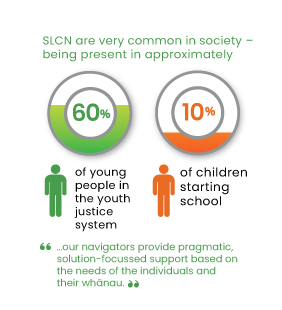Our Speech Language Communication Needs (SLCN) Pilot is a twelve month project designed to support the communication needs of clients of the Bail Support Service at the Manukau District Court.
SLCN is delivered in partnership with the High Impact Innovation Programme – an innovative Government agency responsible for reforming parts of the justice sector, and Talking Trouble Aotearoa – specialist communication support providers with considerable expertise in justice and care and protection settings.
The SLCN pilot aims to test an innovative new way of supporting communication needs – by establishing a small group of ‘navigators’ with strong cultural and interpersonal skills and strong connections within the local community, and providing them with specialist communication training and support from subject matter experts – to support the needs of a greater number of people at a sub-clinical level, and provide pragmatic solution-focused support based on the needs of the individuals and their whānau.
What are Speech Language Communication Needs?
Speech language communication needs (SLCN) are anything that significantly affects a person’s ability to understand and use language in their everyday lives.
This might include things like; having trouble listening, understanding what is being said, confusing words, understanding abstract concepts, understanding time, and remembering what has just happened.
SLCN are very common in society – being present in approximately 10% of children starting school and up to 60% of young people in the youth justice system. SLCNs can cause negative social, educational and employment outcomes, and can often present a significant barrier to accessing and benefitting from support services – with SLCN frequently ignored, or written off as bad behaviour, a lack of intelligence, or attention problems.
However, SLCN can be supported – with many individuals benefiting from timely access to skilled practitioners and simple, yet effective communication tools.
Currently – the public funding for SLCN support, and the limited number of specialist SLCN support provider in New Zealand means most children, youth and adults receive no targeted support.
Our SLCN pilot aims to test a possible solution to this problem, and develop an efficient, cost-effective model for supporting SLCN than can be replicated around New Zealand.
The SLCN Pilot
We are currently working with up to 60 individuals in Manukau – supporting their SLCN during their time on bail. The pilot involves testing different approaches to training and supporting both our own navigator workforce, and the Bail Support Service staff in Manukau, and trialing different approaches to supporting individuals with their SLCN. The pilot will conclude in September 2020, and progress with clients to date suggests that a viable SLCN model for large scale support is achievable, and that further work on the SLCN model will continue throughout 2021 and beyond.

